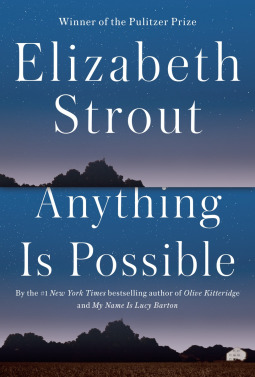The short story collection Anything Is Possible explores the whole range of human emotion through the intimate dramas of people struggling to understand themselves and others.
Here are two sisters: one trades self-respect for a wealthy husband while the other finds in the pages of a book a kindred spirit who changes her life. The janitor at the local school has his faith tested in an encounter with an isolated man he has come to help; a grown daughter longs for mother’s love even as she comes to accept her mother’s happiness in a foreign country; and the adult Lucy Barton (the heroine of My Name Is Lucy Barton) returns to visit her siblings after seventeen years of absence.
(adapted from Goodreads)
More about this collection
Author Elizabeth Strout’s official website
An in-depth review (with interesting thoughts on how to read linked short stories) on the Reading Short Stories blog
Who is Lucy Barton? How Elizabeth Strout created a compelling and realistic story cycle – a really good story from the Booker Prizes website about all things Lucy Barton (with tidbits about the creation of the cycle).
I was particularly fond of this quote:
” … Strout herself does not seem to have conceived the phenomenon now unofficially known as ‘the Lucy Barton story cycle’ with a plan in mind. And, with the latest in the cycle, Lucy By the Sea (her ninth novel and fourth Lucy Barton book) about to come out, we still don’t know whether the cycle is closed or ongoing. These books emerged organically one by one as Strout realised that she wanted to dig around the life of this character …
“With Lucy Barton, Strout has done something generally discouraged within contemporary literary fiction despite being common in commercial fiction: created a universe around a character over multiple books. She has done it without turning any of these books into the obligatory prequels, sequels or any other kind of trope from genre fiction so beloved of marketing departments. So whenever Lucy Barton pops up, you can be sure that she is part of a bigger story. And yet you can also be equally sure that each book stands independently. The Lucy Barton novels are constructed in such a way that they can be discovered on the reader’s terms, not the writer’s.”
I realize that my own work is indeed more of a digital literary art experiment since pretty much all contemporary literary fiction I know of (including the niche form of short story cycles) arrive in print (and more often than not – only print).
Still, I once again find it reassuring that authors as established as Strout, essentially appear to have the same approach to the form of linked short stories, as myself.
Maybe the medium and packing are a bit different but at the heart of it, all is about the attraction to the same way of storytelling.
See also: A Companion to the Works of Elizabeth Strout (my review)
Quote (from the book)
“Annie, who up until this very day had always felt like a child–which is why she could not marry, she could not be a wife–now felt quietly ancient. She thought how for years onstage she had used the image of walking up the dirt road holding her father’s hand, the snow-covered fields spread around them, the woods in the distance, joy spilling through her–how she had used this scene to have tears immediately come to her eyes, for the happiness of it, and the loss of it. And now she wondered if it had even happened, if the road had ever been narrow and dirt, if her father had ever held her hand and said that his family was the most important thing to him.”
– Elizabeth Strout, Anything Is Possible

Leave a Reply